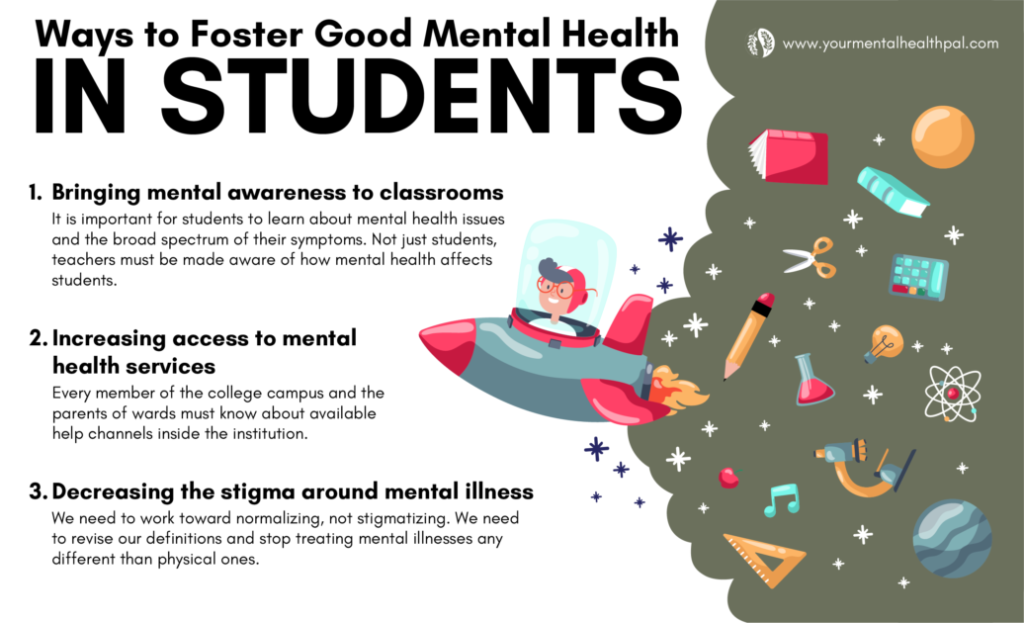
If you have heard it even once, we know you have heard it thousands of times: ‘Schooling and college are the best times of your life. Embrace these years.’ And so you do, or at least you wholeheartedly try to. You embrace them with arms wide open. You try to grab every opportunity that comes your way – credits, internships, clubs, or part-time jobs – we could go on for hours. You are so excited to make the most of these years that you forget yourself and your mental health.
This neglected mental health has consequences for students in the long run. And that brings us to a very important question of how mental health affects students?
Let’s first explain why we addressed student mental health as neglected.
How many times do you create a list of things you have to get done and feel like drowning in the pressure? How often do you think there is no time to fulfill all the responsibilities? Do you ever feel that maybe dropping out from a few won’t be the worst thing ever?
You continue to stress over deadlines and duties. You feel burnt out and overwhelmed, yet you continue. You sacrifice meals, laundry, and time that should be taken out for your mental well-being because you have “more important” things to do.
Don’t get us wrong. These are the absolute best years of your life. But these are also the times when you put your mental health on the back burner because you want to be successful.
And that is why we are here. To remind you to stop worrying about the next deadline or internship and get your mental health in balance.
But first, let us discuss in detail how mental health affects students?
What are the effects of mental health on students?
Mental health scientists and researchers use the term ‘silent epidemic’ or ‘crisis’ to describe the mental health challenges faced by students in America. If you feel they are exaggerating, let’s take you through the statistics about mental health in students in the country.
One in five children living in the US shows signs of a mental disorder in a given year. That means in a class of 25 students; five might be struggling with mental disorders or substance abuse. And yet, a staggering 80% of them do not get the required help.
The statistics from colleges also point heads toward the mental health crisis surging on our campuses today. Almost half of the students had a psychiatric disorder in the past year. 73% of students face some mental health issues during their college years.
Sarah K. Lipson, a Boston University school of public health professor, and her colleagues conducted a research that was published in 2022. The group analyzed the data from 2013 to 2021 and found that the mental health of college students in the United States has been declining consistently. In the last year, there has been a 135% increase in depression and a 110% increase in anxiety among students. Moreover, students with at least one or more mental health problems doubled from 2013 to 2021.
To make matters even worse, there is a lack of services in educational institutions. The college-certified counselors’ ratio is 1:1000-2000 for medium-sized and 1:2000-3500 for larger universities.
These issues have far-reaching consequences for students. Let’s find out how these mental health issues affect students and their academic performances.
1. Engagement
Institutes worldwide often point toward lower engagement with studies from students suffering from mental health issues. Universities now increasingly track engagement levels to identify students who might need support. Students having mental health issues might:
- become uninterested in studies,
- lack of active participation in discussions, and
- have declining attendance in class.
Students facing mental health issues like anxiety or depression might lack the will to attend lectures or have discussions. Such students may show significant negative engagement changes in a short period. The above signs of withdrawal might indicate underlying mental health issues in students.
2. Concentration and Progress
Students facing mental health issues might struggle with concentration issues during the lectures. This may mean that the student might:
- take longer to understand concepts,
- be unable to participate in sessions in the usual way, or
- not be able to focus on the given tasks, etc.
Mental health issues are linked to higher dropout and lower student retention rates. Academic progress might be stunted.
3. Social presence and Relationships
Students facing mental health issues are more likely to become less friendly. They seem less interested in making friends or building any relationships. They lack the enthusiasm to participate in social activities.
Causes of mental health issues in students
The overwhelming numbers regarding mental health in students reflect the need for urgency for proper solutions. However, before we consider solutions, let’s understand the causes of these mental health issues in students.
1. Academic Stress
The relationship between academic pressure and mental health in students is well established. Research has shown that increased academic pressure might lead to low mental well-being and high chances of developing anxiety and depression among students. Additionally, students who have academic stress generally perform poorly at school. Proper help from the academic perspective can help reduce students’ mental health issues.
2. Financial Strain
Financial strains are often associated with increased anxiety and stress among students. Moreover, students dropping out early during fiscal constraints have poor mental well-being. The decision to fund education through student loans leads to even more issues.
The CNBC + Acorns Invest In You Student Loan Survey conducted by Momentive found that almost 60% of borrowers say that education loan has led to mental health issues.
3. Social Media
There is no denying the remarkable effect of social media on people’s lives, especially the younger generation. Though it provides information, social media can seriously impact students’ mental health. The news, trolls, and bullying can create a difficult-to-navigate situation for people online. Added to this, the need to seek validation online and the addictive nature of most social media apps might lead to mental health issues in students.
Ways to foster good mental health in students

How Mental Health Affects Students
Though it feels like an unfathomable issue, there are ways to foster good mental health in students from the institutional to an individual level. Here are some of the most impactful ways psychologists worldwide believe in to bring about a change in students’ mental health.
1. Bringing mental health awareness to classrooms
It is important for students to learn about mental health issues and the broad spectrum of their symptoms. Not just students, teachers must be made aware of how mental health affects students. Early intervention and diagnosis are the keys to fighting mental health issues.
Moreover, students must know where to seek help for a friend or classmate. Everyone on the campus should know where to go for help and what to do if you are worried about someone else.
2. Increasing access to mental health services
Every member of the college campus and the parents of wards must know about available help channels inside and outside the institution. Colleges and schools can set up designated websites to help disseminate information about mental health and well-being.
3. Decreasing the stigma around mental illness
We need to work toward normalizing, not stigmatizing. One of the greatest barriers to seeking help for mental health-related issues in students is the fear of being isolated or marginalized. As discussed above, these issues occur in a large number of students. And hence, we need to revise our definitions and stop treating mental illnesses any different than physical ones.
Conclusion
The outlandish expectations set for students – rooted in competitiveness and social acceptance – are real and detrimental to their mental health. If you are a student going through the same, we know that no blog post is going to describe what it feels like accurately.
With the world lauding the one who slept the least and worked the hardest or the one who is the most stressed and burnt out, mental health is dangerously sidelined.
There is a demand for students to be perfect in academics and social endeavors alike. And this pursuit of perfection culminates in an inhumane amount of pressure. Life becomes a metaphor for walking on eggshells where every small mistake or slip-up is treated as a life-shattering mistake.
This hyper-achieving student community is taught to be laser-pointed toward success. However, no one teaches that it is sometimes okay to fail or rest.
Hopefully, with the amount of change around mental health issues, we shall learn to provide a better and safe space for our students. Efforts in terms of scholarships and mental health services are available for students. To learn about mental health treatment scholarships for college students, click here.
To build a supportive society and know more about mental health, subscribe to Your Mental Health Pal.

